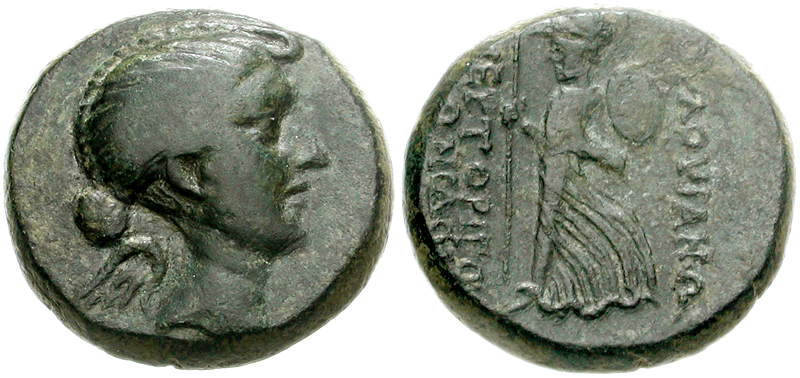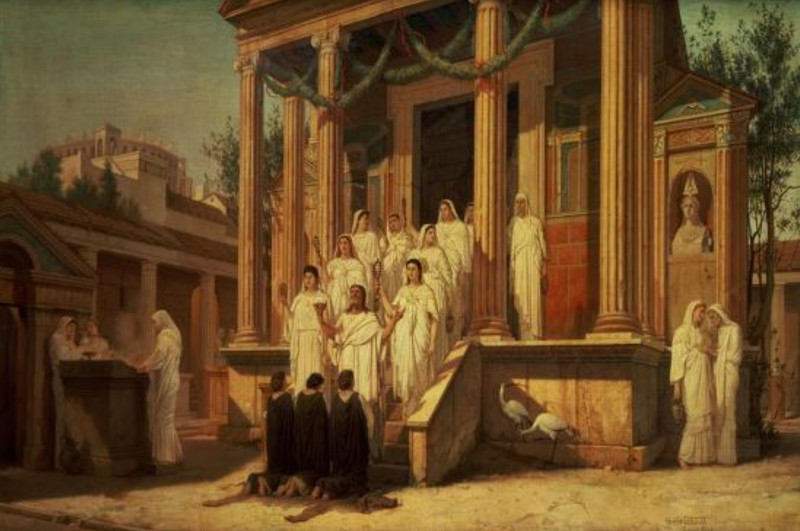
The Three Husbands of Fulvia, the Leading Lady of the Ancient Roman Elites
Modern readers perhaps know Fulvia primarily as the cuckolded wife of Mark Antony and Cleopatra's love rival. But this description falls far short of her figure. In fact, Fulvia was one of the most renowned and politically prominent ladies in antiquity during the final days of the Roman Republic. When she married Antony, her third husband in 44 BC, Fulvia was already a well-known figure in Roman society who carried a significant political clout which would have appealed to Antony at the time.
As the last surviving members of two old families, Fulvia inherited a large fortune. Apart from being savvy on how to utilise her money, she was also savvy in capitalising on her link to the Roman past – both of which are useful to have especially in the turbulent political time in which she lived. Her first marriage to Publius Clodius Pulcher, a member of the very influential Claudian family, also contributed to her clout. Following Clodius’s murder, Fulvia married Caius Scribonius Curio, also a rising politician who died in Africa during the civil war. Her third and final marriage was to Mark Antony, magister equitum, consul, triumvir, and, eventually, Octavian’s greatest adversary.
Fulvia's three husbands were from consular families with prestigious backgrounds. Clodius, who came from the patrician Claudian ancestry, was the son and grandson of a consul, the grandson of a censor, and the brother of a future consul and censor. He also had three sisters, each of whom married a consul. Curio, whose senatorial family had only reached the consulate in 76, could be satisfied with his father's importance in the state and convinced of his own promise. Antony himself could claim two grandfathers who were consuls, one of whom was also censor, as well as two uncles who were consuls, one of whom also became censor.
Few women, even at this age of marital manoeuvring, could boast such a star-studded sequence of husbands as Fulvia. But, impressive as her marriages may be, Fulvia was never just the wife of a politician. Lactantius, likely echoing Cicero in the De Republica, provides a context for anyone interested in the political importance of women in the time of Rome’s civil war. Women were able to achieve power in a state where their official potential was strictly limited to certain religious positions, not only through the institution of political or dynastic marriage, which was critical to the balance of affairs in the last century of the Republic, but also through the exercise of personal talents and influence.

Bust of Fulvia (left) and image of Athena (right) on a Phrygian coin. (CNG / CC BY-SA 3.0)
The First Romance of Young Fulvia
Fulvia’s family, the Fulvii, were one of the most prominent republican noble families originating in Tusculum, Latium, central-western Italy. The Fulvii name has appeared in the consular fasti for two centuries, beginning in 322 BC. However, no consular by the name of Fulvius was recorded after 125 BC. Indeed, during the Sullan restoration of the oligarchy, prominent ancient Roman families such as the Fulvii, Sempronii and Livii were almost extinct. Fulvia's father, Marcus Fulvius Bambalio, who may be the last male in his line to bear the name. Not known to have held office despite being the son of the consul of 129, he married the youngest daughter of another plebeian house, the Sempronii Tuditani. The orator Cicero describes Fulvia's father, Marcus Fulvius Bambalio, as “a wealthy man of no consequence”. As Bambalio means “stammerer”, we can guess that Fulvia’s father may have had a speech impediment which could explain Cicero’s harsh condemnation of him. Cicero implies that Fulvia’s father was considered a joke of a man. Sempronius Tuditanus, Fulvia's maternal grandfather, is better known, but only because he was feeble-minded for long of his life according to Cicero. All these do not look to be a promising legacy for Fulvia to pass down as a dower to her aspiring husbands. But there is another dower element that she may have had, possibly in abundance: money.
A passage in Marcus Terentius Varro’s Res Rusticae tells us that Clodius' brother Appius remarks on the poverty he and his family had known after their father's death that “for when I was left poor with two brothers and two sisters, I gave the other to Lucullus without a dowry.” Although this does not imply abject poverty, it does mean that three politically ambitious sons (a career in politics were expensive even then) and two remaining unmarried daughters of a large patrician family may be in some difficulty at least before Clodius’ marriage to Fulvia.
Fulvia was presumably around 18 years old when she married Publius Clodius Pulcher. Around the time of their marriage, Clodius had sneaked into a religious gathering for ladies exclusively at Julius Caesar's house while dressed as a woman and was taken to court on charges of endangering the chastity of Rome's Vestals. Despite Cicero's best efforts to charge him in court, Clodius escaped without charge, his aristocratic background and powerful relationships proving helpful.





